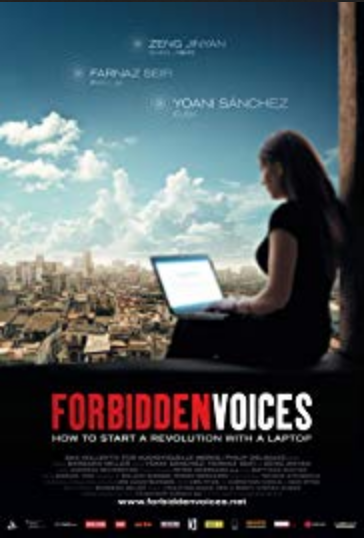
I (Hannah Jones, ’21) attended a screening of the film Forbidden Voices on November 18, 2019, at the Knickerbocker Theater in downtown Holland. This event was sponsored by Hope College’s Markets & Morality students organization and co-sponsored by the Center for Global Engagement, Global Studies Program, Asian Studies Program, Phelps Scholars Program, Department of Political Science, Department of Religion, Women’s and Gender Studies Program, and a chapter of Engineers Without Borders.
Forbidden Voices focuses on the stories of three female bloggers– Yoani Sanchez from Cuba, Zeng Jinyan from China, and Farnaz Seifi from Iran. The film is specifically interested in the ways that the Internet can be a platform for those who are silenced by oppressive governments. Sanchez, Jinyan, and Seifi have all used the Internet to draw attention to human rights violations in each of their countries. One of the most powerful aspects of the documentary was the way that it showed the consequences of speaking out in protest– Sanchez has been beaten and arrested, Jinyan has been forced into house arrest, and Seifi has been forced to leave her country.
After the film, WGS student Maddie Zimmerman hosted a talk-back. Before entering the theater, attendees were given a slip of paper with post-film discussion questions about our initial reactions to the film, the importance of free speech as it contributes to human flourishing, and how blogging is a powerful tool for women living in oppressive societies. We were encouraged to form small groups and discuss these questions before sharing our answers with everyone else.
The screening of Forbidden Voices was part of the NEA Big Read Lakeshore. This year, the Big Read chose Julia Alvarez’s books In the Time of the Butterflies and Before We Were Free, which was selected for middle-grade readers. These historical fiction books are set in the Dominican Republic during the Trujillo dictatorship that lasted from 1930-1961 and ended when he was assassinated. Although both accounts are fictional, they focus on themes of resistance and silence, and more specifically, speaking out when doing so is punished by the government.
The Little Read Lakeshore chose the children’s picture book The Rooster Who Would Not Be Quiet!, written by Carmen Agra Deedy and illustrated by Eugene Yelchin. The theme of this book is similar to those written by Alvarez– when the mayor of the city of La Paz institutes a new law against singing, one rooster speaks up in protest.
The concept of speaking up for one’s self or for others when they are unable to do so has been an important and ongoing discussion in my WGS classes. It can be challenging to know how and when to speak up for others, but the Internet has emerged as a powerful tool for the oppressed to talk back. Various platforms– blogs, Twitter, and Facebook, among others– have been excellent resources for many women like Sanchez, Jinyan, and Seifi. Because voices on the Internet can be so easily shared, blogs and other platforms are able to reach an unprecedented number of people and do so quickly. This has created the opportunity for widespread, international attention to violations of human rights and free speech around the world. In societies in which women are not respected and valued as fully human, online tools give voices to those who have for so long been rendered voiceless.
Finding one’s voice during a time of political unrest and violence has been a theme in the Children’s and Young Adult Literature that I took this semester. As both an English and a WGS major, one of my favorite things is finding interdisciplinary connections. My class read Alvarez’s book Before We Were Free and focused on the protagonist’s journey to use diary-keeping as a tool of resistance. Anita, the protagonist, begins her diary as a way to leave a record that will help others who are in hiding. She discovers the power of using words to document her trauma and gain control over her voice. Towards the end of the book, Anita writes, “if I stop now, they’ve really won. They’ve taken away everything, even the story of what is happening to us” (Alvarez 124). Alvarez expands on this idea in the author’s note, writing, “the silencing of those who have lived in terror is not just an external thing; it’s also a way in which the whole self shuts down. Anita’s silence is symbolic of what is happening to her country” (177). Like Anita, Sanchez, Jinyan, and Seifi have used online writing as a tool of resistance during a time of intense oppression. This documentary, especially when paired with the Big Read, serves as a great testimony to the power of finding one’s voice when it is forbidden.
Works Cited
Alvarez, Julia. Before We Were Free. Ember, 2018.

